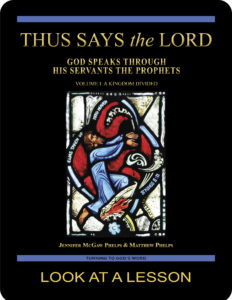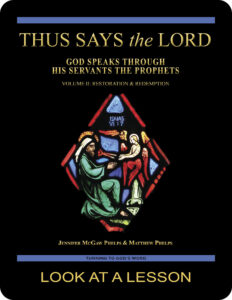Immanuel
 In the seventh chapter in the Book of Isaiah (NABRE) and the first chapter in the Gospel According to Matthew (NABRE), we encounter two of the three times in the Bible where the Hebrew word Immanuel appears. The third occurs in eighth chapter in the Book of Isaiah (NABRE). Since Immanuel symbolically is the name assigned to Jesus the Messiah, it’s worth delving a bit into what this name means.
In the seventh chapter in the Book of Isaiah (NABRE) and the first chapter in the Gospel According to Matthew (NABRE), we encounter two of the three times in the Bible where the Hebrew word Immanuel appears. The third occurs in eighth chapter in the Book of Isaiah (NABRE). Since Immanuel symbolically is the name assigned to Jesus the Messiah, it’s worth delving a bit into what this name means.
The Hebrew עִמָּנוּאֵל (Immanuel) is a combination of two words, the word for God and the preposition “with” and so literally means “God with us” or “with us is God.” The Greek text in the Gospel According to Matthew refers to this same word, Ἐμμανουήλ (Emmanouel), but in the carryover to the Greek alphabet, the initial vowel changes, and this change also carried over into Latin texts, which explains why today we tend to see Emmanuel rather than Immanuel.
An interesting question about this name is posed by this Sunday’s readings. Isaiah’s prophecy suggests the Messiah will be named Immanuel, but we know that his name instead was Jesus. How can Jesus still be a fulfillment of this prophecy if he has a different name? In the ancient world, someone’s name was more than what the person was called. It was a reflection of that individual’s identity. Jesus very literally is “God with us” whether he is called by that name or not. This Advent season, it’s this presence of God among us that we celebrate and await.
you also may like our two-part study of the prophets

 Thus Says the LORD: God Speaks Through His Servants the Prophets—Volume I: A Kingdom Divided examines the prophets in their historical context using the First and Second Books of the Kings and other Old Testament passages written before the Babylonian Exile in 586 B.C. Volume II: Restoration & Redemption looks at the post-exilic prophets. This 51-lesson Catholic Bible study builds on The United Kingdom of Israel: Saul, David & Solomon Foreshadow Christ the King. Click on the books’ covers to view a sample lesson from each volume.
Thus Says the LORD: God Speaks Through His Servants the Prophets—Volume I: A Kingdom Divided examines the prophets in their historical context using the First and Second Books of the Kings and other Old Testament passages written before the Babylonian Exile in 586 B.C. Volume II: Restoration & Redemption looks at the post-exilic prophets. This 51-lesson Catholic Bible study builds on The United Kingdom of Israel: Saul, David & Solomon Foreshadow Christ the King. Click on the books’ covers to view a sample lesson from each volume.
 Click on the picture of the statue of Moses with horns (above) to learn more about Lost in Translation. A new entry is archived each Monday. Contact us to receive Lost in Translation by email every week. You may use any of the contact links on our website to ask Matthew a question.
Click on the picture of the statue of Moses with horns (above) to learn more about Lost in Translation. A new entry is archived each Monday. Contact us to receive Lost in Translation by email every week. You may use any of the contact links on our website to ask Matthew a question.
